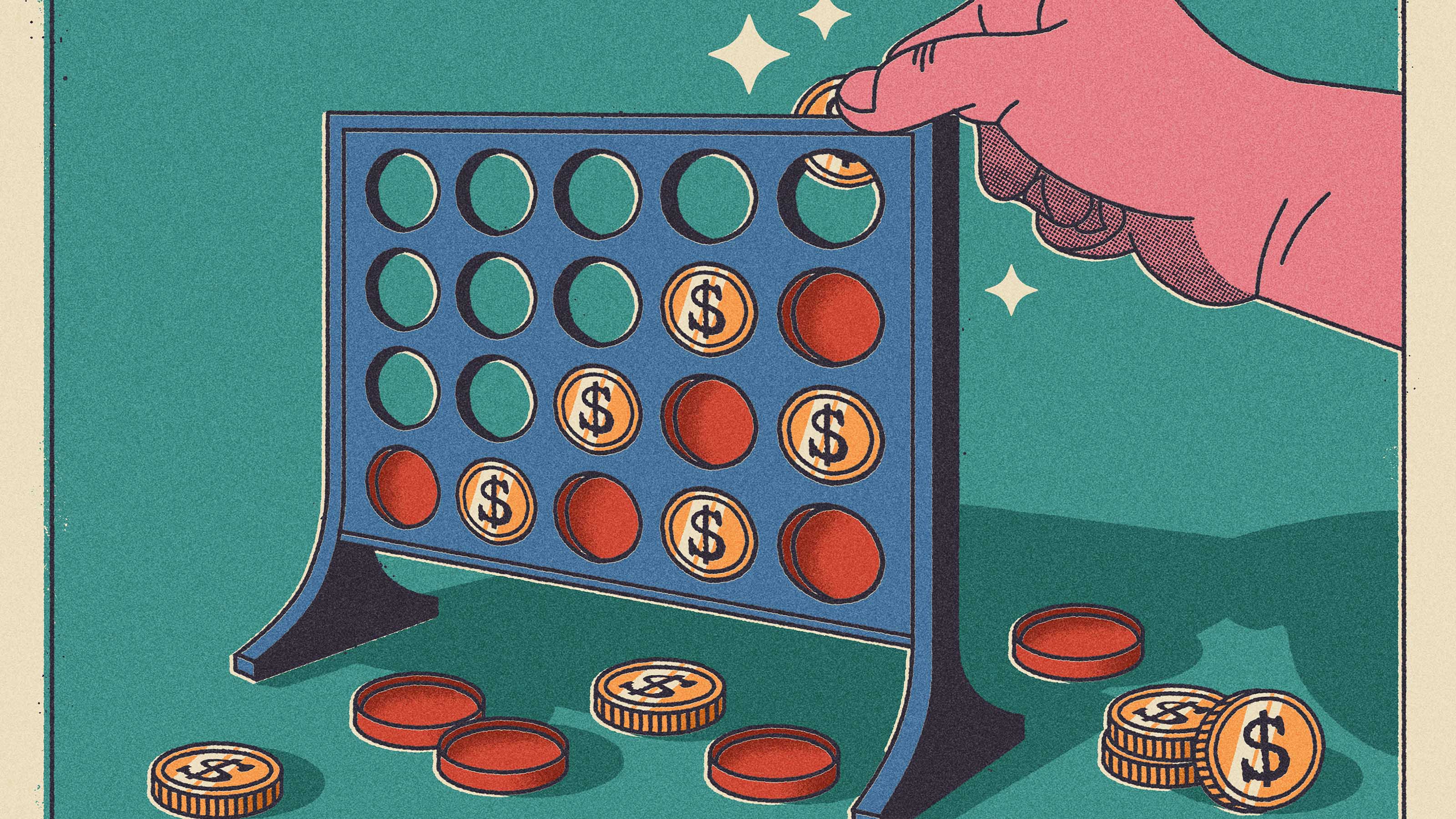5 "Moneyball" Lessons for Investors
You can glean some useful investing tips from Oakland Athletics general manager Billy Beane's strategies for baseball.

Profit and prosper with the best of Kiplinger's advice on investing, taxes, retirement, personal finance and much more. Delivered daily. Enter your email in the box and click Sign Me Up.
You are now subscribed
Your newsletter sign-up was successful
Want to add more newsletters?

Delivered daily
Kiplinger Today
Profit and prosper with the best of Kiplinger's advice on investing, taxes, retirement, personal finance and much more delivered daily. Smart money moves start here.

Sent five days a week
Kiplinger A Step Ahead
Get practical help to make better financial decisions in your everyday life, from spending to savings on top deals.

Delivered daily
Kiplinger Closing Bell
Get today's biggest financial and investing headlines delivered to your inbox every day the U.S. stock market is open.

Sent twice a week
Kiplinger Adviser Intel
Financial pros across the country share best practices and fresh tactics to preserve and grow your wealth.

Delivered weekly
Kiplinger Tax Tips
Trim your federal and state tax bills with practical tax-planning and tax-cutting strategies.

Sent twice a week
Kiplinger Retirement Tips
Your twice-a-week guide to planning and enjoying a financially secure and richly rewarding retirement

Sent bimonthly.
Kiplinger Adviser Angle
Insights for advisers, wealth managers and other financial professionals.

Sent twice a week
Kiplinger Investing Weekly
Your twice-a-week roundup of promising stocks, funds, companies and industries you should consider, ones you should avoid, and why.

Sent weekly for six weeks
Kiplinger Invest for Retirement
Your step-by-step six-part series on how to invest for retirement, from devising a successful strategy to exactly which investments to choose.
I didn’t start reading Michael Lewis’s Moneyball for stock market advice. I just wanted a good read during the battle with middle-age bulge I wage every morning on the cross-trainer. But I hadn’t even made it through the introduction before I started comparing the strategies of Oakland Athletics general manager Billy Beane with those of the wisest investors I’ve encountered over the years. These lessons are worth sharing.
Don’t believe your eyes. Baseball, like investing, can so stir your emotions that perception belies reality. Watch a player slug a couple of home runs and you may believe he’s a star. You may not notice that he reaches base barely more than one-fourth of the time. Investors are likely to react similarly to hot stocks and funds. Before you invest in a company because, say, it knocked the cover off the ball with its last earnings report, check the longer-term record to see how regularly those long balls occur.
Capitalize on inefficiencies. When the cognoscenti see a flaw in a player—say, a pitcher’s unusual throwing motion or an injury that affects the player’s throwing (but not his hitting)—they’ll tend to knock down his value. So it is with stock picking. When investors detect a problem at a company, they’ll knock down the price of its stock. Beane would dig into the numbers to find players he liked. He’d then put them on a wish list and pick them up when the market discounted the player’s value because something was amiss. What Beane did was the baseball equivalent of what Warren Buffett does: Buy good companies when they’re cheap and out of favor.
From just $107.88 $24.99 for Kiplinger Personal Finance
Become a smarter, better informed investor. Subscribe from just $107.88 $24.99, plus get up to 4 Special Issues

Sign up for Kiplinger’s Free Newsletters
Profit and prosper with the best of expert advice on investing, taxes, retirement, personal finance and more - straight to your e-mail.
Profit and prosper with the best of expert advice - straight to your e-mail.
Don’t watch the game. When the A’s were on the field, Beane went to the gym. He feared that he’d do something rash if he saw his players or coaches make mistakes. That’s a wise approach for most investors, too, especially if you’re likely to react to market volatility. There’s no need to look at your accounts daily. You need to look at your investments maybe once a quarter or once a year. Otherwise, find something else to do. Go to work. Volunteer. Play catch. Read a book. Take the kids to a movie. Just don’t sit by your computer screen and watch your stocks on a bad day. Obsessing over your portfolio is likely to cause you to act in a way that you’ll regret later.
One game is not a season. The A’s calculated the number of games they had to win to reach the playoffs. They recognized that with their low-cost roster, they were not going to win them all. Neither will you. But if you win with more than half of your investments—and don’t take a bath on your failures—you’ll be ahead of the game in the end.
Experience reduces risk. People like to invest in initial public offerings because they figure they can make big money fast by betting on a dream. But the younger the company, the shorter the track record and the more likely it is to fail. The same holds true in baseball. A kid drafted out of high school stands little chance of making it to the big leagues. Beane considered college players a safer bet because they have more experience. Similarly, the longer a company’s history, the better investors can see how it has managed through good times and bad. That reduces the risk that you’ll lose everything on a stock—the kind of setback that can wreck your entire season.
New purchase. A final (unrelated) note: I picked up shares of Seagate Technology (symbol STX), which we wrote about a few months ago (see An Old Tech Lion Roars Back). I paid $23.12 per share and am delighted to report that an announcement of strong second-quarter earnings caused the stock to soar 31% in just a few weeks. With the purchase, my portfolio is now fully invested in stocks.
Kathy Kristof is a contributing editor to Kiplinger’s Personal Finance and author of the book Investing 101. Follow her on Twitter. Or email her at practicalinvesting@kiplinger.com.
Profit and prosper with the best of Kiplinger's advice on investing, taxes, retirement, personal finance and much more. Delivered daily. Enter your email in the box and click Sign Me Up.

-
 How to Watch the 2026 Winter Olympics Without Overpaying
How to Watch the 2026 Winter Olympics Without OverpayingHere’s how to stream the 2026 Winter Olympics live, including low-cost viewing options, Peacock access and ways to catch your favorite athletes and events from anywhere.
-
 Here’s How to Stream the Super Bowl for Less
Here’s How to Stream the Super Bowl for LessWe'll show you the least expensive ways to stream football's biggest event.
-
 The Cost of Leaving Your Money in a Low-Rate Account
The Cost of Leaving Your Money in a Low-Rate AccountWhy parking your cash in low-yield accounts could be costing you, and smarter alternatives that preserve liquidity while boosting returns.
-
 The Most Tax-Friendly States for Investing in 2025 (Hint: There Are Two)
The Most Tax-Friendly States for Investing in 2025 (Hint: There Are Two)State Taxes Living in one of these places could lower your 2025 investment taxes — especially if you invest in real estate.
-
 The Final Countdown for Retirees with Investment Income
The Final Countdown for Retirees with Investment IncomeRetirement Tax Don’t assume Social Security withholding is enough. Some retirement income may require a quarterly estimated tax payment by the September 15 deadline.
-
 How to Beef Up Your Portfolio Against Inflation
How to Beef Up Your Portfolio Against Inflationinvesting These sectors are better positioned to benefit from rising prices.
-
 Taxable or Tax-Deferred Account: How to Pick
Taxable or Tax-Deferred Account: How to PickInvesting for Income Use our guide to decide which assets belong in a taxable account and which go into a tax-advantaged account.
-
 Smart Investing in a Bear Market
Smart Investing in a Bear Marketinvesting Here's how to make the most of today’s dicey market.
-
 How to Open a Stock Market Account
How to Open a Stock Market Accountinvesting Investing can be fun, but you need a brokerage account to do it. Fortunately, it’s easy to get started.
-
 The Right Dividend Stock Fund for You
The Right Dividend Stock Fund for YouBecoming an Investor Dividend stock strategies come in many different flavors. Here's what to look for.
-
 Alternative Investments for the Rest of Us
Alternative Investments for the Rest of UsFinancial Planning These portfolio diversifiers aren't just for the wealthy.